GALLUP NEWS SERVICE
PRINCETON, NJ -- The space shuttle Discovery is scheduled to launch this Saturday on a mission to the International Space Station. This will be the second shuttle mission since the space shuttle Columbia broke apart reentering the earth's atmosphere in early 2003.
Americans Divided Over Worthiness of Space Shuttle Spending
A recent USA Today/Gallup poll, conducted June 23-25, finds that Americans are split down the middle in terms of their views of the value of the money spent on the space shuttle program.
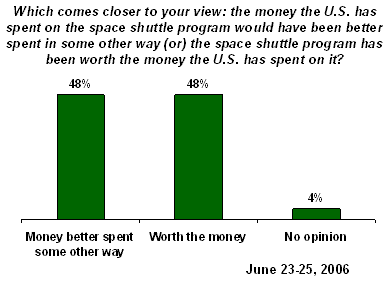
Forty-eight percent of Americans say the space shuttle program has been worth the money the government has spent on it. The same percentage, 48%, says that the money would have been better spent in some other way.
The fact that less than a majority endorses the spending on a space program is not a new phenomenon. During the 1960s, when the United States increased spending on sending astronauts to the moon, a higher percentage of Americans consistently said it was not worth spending the money to accomplish the feat.
Majority of Americans Rate NASA Positively
The poll also updated Gallup trends on the public's more general attitudes about NASA. The results show that a majority of Americans, 57%, rate the job NASA is currently doing as excellent (17%) or good (40%), while 37% rate it as only fair (30%) or poor (7%).
Americans' ratings of NASA have generally been positive since Gallup first asked this question in 1990. The low point of NASA ratings came in 1993, when 43% gave it an excellent or good rating, at the time when NASA "lost" the Mars Observer probe and was having trouble getting clear pictures from the Hubble telescope. The highpoint came in 1998, with a 76% rating, as John Glenn returned to space via the shuttle Discovery. Ratings of the space agency fell back from 1999 though 2005, but still remained in positive territory. The current 57% rating is just slightly lower than a 60% rating from last summer.
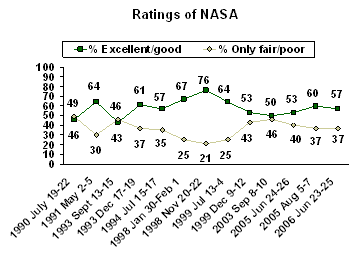
One in Three Want to Reduce or End Spending on the Space Program
The latest poll also finds no strong sentiment about future spending for NASA. About half of Americans, in fact, say that spending on the space program should remain at its present level. One-third says that it should be reduced or ended entirely, while 17% say that spending on NASA should be increased.
Fewer say spending should be maintained or increased now than did so three years ago, when the question was last asked. In two surveys conducted shortly after the Columbia disaster, three in four Americans said government spending should be increased or kept the same. Now, roughly two in three Americans feel this way. The poll also shows a slight up-tick in the percentage of Americans who want spending on NASA reduced or eliminated altogether, up from 24% in 2003 to 33% now. Still, this percentage has been as high as 51% at various points in the past.
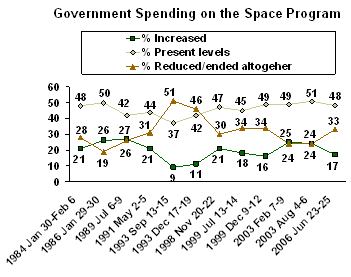
Partisanship Shapes Views on NASA Spending
Republicans (including independents who lean toward the Republican Party) and Democrats (including Democratic-leaning independents) rate the overall job that NASA is doing similarly. However, the two party groups differ in their views on government spending on the space shuttle program or NASA more generally.
Overall, 58% of both Republicans and Democrats say NASA is doing an excellent or good job right now.
|
Ratings of NASA |
||
|
Republicans |
Democrats |
|
|
% |
% |
|
|
Excellent |
18 |
17 |
|
Good |
40 |
41 |
|
Only fair |
31 |
29 |
|
Poor |
6 |
7 |
|
|
|
|
|
Excellent/good |
58 |
58 |
|
Only fair/poor |
37 |
36 |
Democrats are slightly more likely than Republicans to say government spending on the space program should be reduced or eliminated altogether, with 28% of Republicans and 37% of Democrats expressing that point of view. The highest percentage among both party groups say government spending on NASA should be kept at its present level.
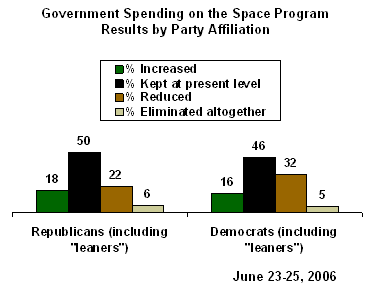
Democrats are also more likely than Republicans to say the money the government has spent on the space shuttle program would have been better spent elsewhere, by a 53% to 40% margin.
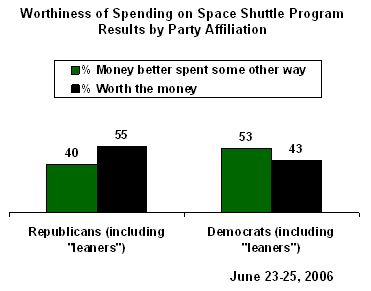
Survey Methods
Results are based on telephone interviews with 1,000 national adults, aged 18 and older, conducted June 23-25, 2006. For results based on the total sample of national adults, one can say with 95% confidence that the margin of sampling error is ±3 percentage points. In addition to sampling error, question wording and practical difficulties in conducting surveys can introduce error or bias into the findings of public opinion polls.
17. How would you rate the job being done by NASA -- the U.S. space agency? Would you say it is doing an excellent, good, only fair, or poor job?
|
Excellent |
Good |
Only fair |
Poor |
No opinion |
|
|
% |
% |
% |
% |
% |
|
|
2006 Jun 23-25 |
17 |
40 |
30 |
7 |
6 |
|
|
|
|
|
|
|
|
2005 Aug 5-7 |
16 |
44 |
29 |
8 |
3 |
|
2005 Jun 24-26 |
11 |
42 |
34 |
6 |
7 |
|
2003 Sep 8-10 |
12 |
38 |
36 |
10 |
4 |
|
1999 Dec 9-12 |
13 |
40 |
31 |
12 |
4 |
|
1999 Jul 13-4 |
20 |
44 |
20 |
5 |
11 |
|
1998 Nov 20-22 |
26 |
50 |
17 |
4 |
3 |
|
1998 Jan 30-Feb 1 |
21 |
46 |
21 |
4 |
8 |
|
1994 Jul 15-17 |
14 |
43 |
29 |
6 |
8 |
|
1993 Dec 17-19 |
18 |
43 |
30 |
7 |
2 |
|
1993 Sept 13-15 |
7 |
36 |
35 |
11 |
11 |
|
1991 May 2-5 |
16 |
48 |
24 |
6 |
6 |
|
1990 July 19-22 |
10 |
36 |
34 |
15 |
5 |
Q.18-19 SPLIT SAMPLED
18. Now I'd like to ask you about government spending on NASA. In answering, please bear in mind that sooner or later all government spending has to be taken out of the taxes that you and other Americans pay. Do you think spending on the U.S. space program should be increased, kept at the present level, reduced, or ended altogether?
BASED ON 484 NATIONAL ADULTS IN FORM A
|
Increased |
Present |
Reduced |
Ended |
No |
|
|
% |
% |
% |
% |
% |
|
|
2006 Jun 23-25 |
17 |
48 |
28 |
5 |
2 |
|
|
|
|
|
|
|
|
2003 Aug 4-6 |
24 |
51 |
17 |
7 |
1 |
|
2003 Feb 7-9 |
25 |
49 |
17 |
7 |
2 |
|
1999 Dec 9-12 |
16 |
49 |
24 |
10 |
1 |
|
1999 Jul 13-14 |
18 |
45 |
26 |
8 |
3 |
|
1998 Nov 20-22 |
21 |
47 |
26 |
4 |
2 |
|
1993 Dec 17-19 |
11 |
42 |
38 |
8 |
1 |
|
1993 Sep 13-15 |
9 |
37 |
41 |
10 |
3 |
|
1991 May 2-5 |
21 |
44 |
28 |
3 |
4 |
|
1989 Jul 6-9 |
27 |
42 |
22 |
4 |
5 |
|
1986 Jan 29-30 |
26 |
50 |
14 |
5 |
5 |
|
1984 Jan 30-Feb 6 |
21 |
48 |
23 |
5 |
4 |
19. Which comes closer to your view -- [ROTATED: the money the U.S. has spent on the space shuttle program would have been better spent in some other way (or) the space shuttle program has been worth the money the U.S. has spent on it]?
BASED ON 516 NATIONAL ADULTS IN FORM B
|
Money better spent |
Worth the |
No |
|
|
|
|
|
|
|
2006 Jun 23-25 |
48% |
48 |
4 |